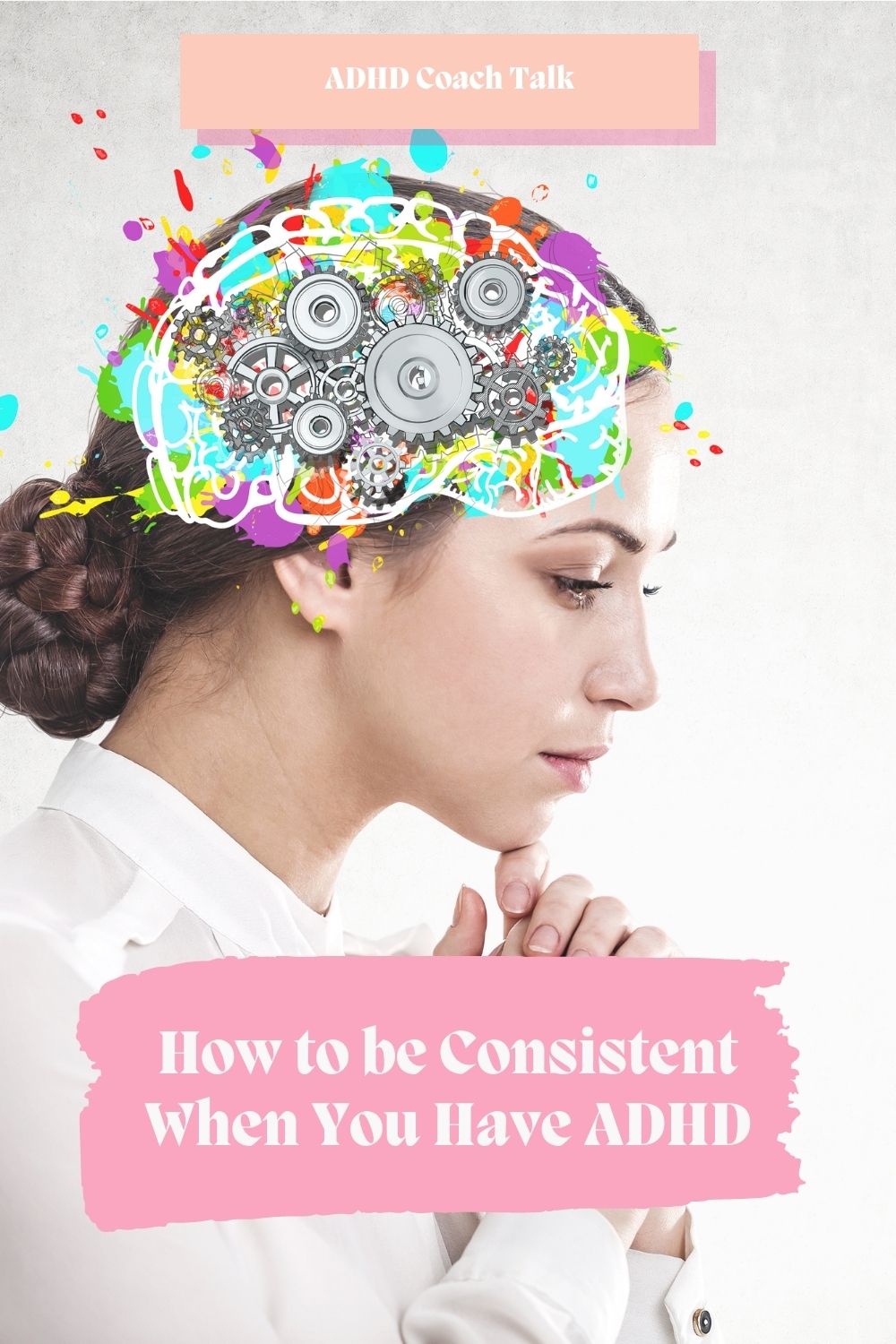Head's up, there could be affiliate links ahead!
ADHD and consistency aren’t the best of friends. In this blog post, I cover the reason why we struggle with consistency, and how to overcome it. Because here’s the thing – even though consistency isn’t a strength of ADHD, it’s also not an impossibility. You can learn this skill, just as I have learned it, so let’s dive right in!
ADHD and Consistency – why is it so hard?
First, you might be curious to know WHY folks with ADHD tend to be less consistent than their neurotypical counterparts. There’s no one specific answer here, but what we do know is that ADHD is defined as a lack of attentional regulation because we have interest-driven brains rather than importance driven brains (which is what our neurotypical counterparts have).
So we may know that it’s important to be consistent about certain things, but unless it’s interesting to use, we struggle to regulate our attention on those things and follow through.
This isn’t because we’re trying to be defiant or lazy. It’s because our brains aren’t willing to bring certain activities into focus long enough to complete them. Add to that, our struggles with short term memory and we often can’t even remember what we wanted to be consistent with half the time.
How to Get Better at Being Consistent with ADHD?
Broadly speaking, it comes down to being selective about the things you’re willing to build consistency around, getting really clear about why it’s important and connecting that to something that’s interesting or compelling to your brain (so you’re getting your brain on board) and then creating structure and boundaries to follow through.
This is what has helped me be consistent in ways that I’ve NEVER been able to be in the past. I have people in my life that have known me to be consistently inconsistent tell me how amazed they are at how I’m consistently showing up in my business and I’m pretty amazed at myself.
So now I’m going to break down what I’ve done to create this level of consistency in my life and how you can apply it to your own life in a very tactical way. And please stick around to the end because I have an announcement that’s going to impact my channel and how I’m showing up here for the next while. It ties in beautifully with this topic, so let’s just get right to it.
Narrow Down Your Focus
Pick one or two things at most to focus on at any given time. This is hard for ADHD brains because we’re divergent thinkers who have interest driven brains, so when you have a lot of interests, it’s really hard to not want to do them all.
We’re also chronic people pleasers based on years of feeling as though we don’t measure up, not to mention dealing with Rejection Sensitivity Dysphoria (RSD).
However, picking one thing to focus on doesn’t mean everything else goes away. It just waits in the sidelines for a while until you nail this one thing. Then you can reward yourself with the next juicy thing. I’m not asking you to work against your interest driven brain – I’m simply asking you to tame it long enough to see things through to completion.
Improve Consistency by Saying “NO” to Distractions
In other words, decide what you’re going to say no to in order to prioritize your one thing, so that you have the space and time to build consistency. Most of my clients suffer from self-induced overwhelm because they take on too much without thinking about how saying yes will impact our capacity.
When we say yes to everything we are creating an expectation of ourselves that is physically impossible. We cannot commit to 26 hours of obligations a day when we only have 24. That’s an automatic fail.
Know Your Why Behind the Why
Meaning, know why your one thing is important, but also identify why it’s compelling to you. So, not just the why that makes logical sense, but the why that will give your interest-driven brain a reason to buy in. If you don’t have this buy-in, you’re setting yourself up to fight with your own biology and neurological wiring. That’s not going to be fun, and you might not win.

Be clear about what done looks like.
This is another area where many of my clients get hung up. They keep achieving goals they set for themselves, but given their inattentiveness, they completely miss that they’ve past significant milestones. They just keep charging and only stop when their body falls apart.
Knowing what done looks like, writing it down in clear detail and then tracking towards that goal is the only way you’re going to start realizing how often you DO accomplish things and that you are capable of anything. We achieve so much, but we just forget, or don’t pay attention to it.
Beware of magical thinking
Do you tend to assume you can do everything yourself? Magical thinking kicks in when we think we can do it all, even when logically, there’s no possible way we can.
Our brains are not great at prioritization in the moment, and we have been known to be impulsive with our decisions. That said, it’s important to not agree to things in the moment (give yourself a cooling off period) and also ask a trusted friend to tell you if your expectations aren’t aligning with reality.
Get Clear on Next Steps
Once we know what we want, we’ve gut checked that it’s realistic and we know what “done” looks like, the next step is to list out all the steps that need to happen to get things done.
Ambiguity breeds procrastination, so if something isn’t clear, then it needs to be broken down into smaller steps. Clarity breeds consistency!
Plan Your Steps
Once you list out everything you need to do, and your steps are clear and actionable, it’s time to block out time on your calendar to get it done. This is a power-habit, because our calendars can keep us accountable. The key here is to get in the habit of checking your calendar more than once per day.
If you want more help with this process, I created videos on planning your week, planning your month and planning your quarter linked below.
Externalize accountability
Our memory isn’t always reliable, so it’s really important to have lots of external accountability and reminders to keep us focused on our key priority. I use a big whiteboard calendar in my office that I glance at all the time. I also leverage bodydoubling, I share my commitments with my Instagram community, I have an accountability partner, and I’m really big on creating my own rewards for getting things done.
Dial Pressure Up or Down
Take the pressure off by letting go of outcomes or turn the pressure on by promising to deliver something. Consider what will engage your brain more. Sometimes we just need to create because we’re compelled too. In that case, don’t put unhealthy expectations on the results of your project.
The same is true for dating, or anything else where outcomes aren’t in our control. But if you want to do something and you need a fire lit under your tush, then create that instead.
Celebrate completion
This comes back to knowing what done looks like and then taking a moment…. a long moment to acknowledge when you get there. So often we over-index on stuff that doesn’t get done and our negative stories are way more sticky than our positive stories (because we have a negativity bias).
But, you can counteract this by dwelling in your successes long enough that they get registered in your long term memory. In doing this, we start to create a new identity of being someone who follows through and gets things done.
Give Yourself Breaks From Being Consistent
I don’t know about you, but I have a tendency to create rigid rules for myself. I’m flexible with other people, but myself? No slack there.
So I was talking to my coach last week about how I was feeling overwhelmed with all the things I was doing – between the youtube channel, the podcast, my coaching practice AND a new program that I’m working on, that will help my community shift from distraction into action. I feel really strongly that this work needs to make it into the hands of anyone who struggles with follow through, consistency, and overwhelm, but here’s the thing – I can’t say yes to getting this done unless I say no to something else. Even if just temporarily.
So to that end, I’ve decided to take the month of July off from Youtube so that I can make completing this program my “one thing”. I hope you all will keep me accountable by watching out for my next video that will be live on August 5th.
Finding YOUR Way to Consistency With ADHD
So that’s a long list of tips that have helped me create consistency with ADHD. This might be overkill for you, or it might just be the tip of the iceberg in terms of improving your follow-through.
My best advice that I can leave you with is to take what resonates with you here, and implement slowly. Maybe start by getting into the habit of checking your calendar a few times a day, if that’s not something you’re currently doing. The key to success is not to take it all on at once!






Leave a Comment